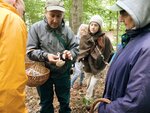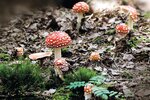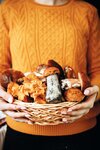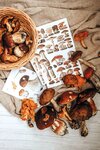



Mushrooms can benefit your landscaping efforts as well as add variety to your dinner table. They can also be fun to study because of their complex nature and the sheer challenge of the science involved. You can learn a tremendous amount about nature from studying the fifth kingdom of fungi.
Much has been written about the Wood Wide Web and the relationships between mushrooms, trees, and plants. In fact, many plants could not exist at all without their mushroom partners. Some companies have even produced soil additives, a sort of mushroom fertilizer you can add to your soil when planting a tree, bush or vegetables.
However, one should hold a certain degree of skepticism as to how well these soil additives work. After all, only a few kinds of mushrooms can be cultivated commercially, and they will not necessarily work with every bush or tree or plant you wish to grow.
Another, even more, natural technique one could try if you wish to, say, establish a new blueberry bush in your garden is to find a similar tree or plant that is already established in your area. Make a collection of soil, including some leaf litter around it at multiple spots. No need to dig deeper than about 8”-10” at each of about a dozen spots. Add this soil in your planting, and let us know how it works out.
Hunting mushrooms for the table is also a fun sport. It’s not really “hunting.” After all, there are no weapons or traps used in foraging. Perhaps terms such as “searching” or “gathering” are more appropriate, but, let’s face it, they don’t quite have the same ring to them.
Mushroom hunting knowledge is often carried down from generation to generation within a family as well as are, perhaps, your uncle’s secret spots.
It is important to carry a bit of healthy skepticism with you when you hear generalized rules of thumb about what an edible mushroom is versus what it is not. At the same time, it is also important to try to resist giving into “mycophobia,” the generalized fear of all mushrooms, because not nearly as many mushrooms are poisonous as some literature would lead you to believe. Rules of thumb regarding what an edible mushroom is can become relevant
once you know what genus or family of mushroom you have.
But nothing beats actually having studied a given group of mushrooms and learning individual species, as well as their lookalikes. Then you can gather wild edible mushrooms with confidence.
Many good mushroom-hunting trails exist in our region. Look for areas with mixed hardwoods and conifers and, ideally, a lake or stream. Our summers have become more drought ridden so having a water source nearby can help stimulate some mushroom fruitings. Consider taking a long, slow hike towards the end of summer when the rains begin again locally. Some local options here on Cape Ann? Try Anne’s Woods, the Monoliths, Millstone Hill, or the Warren Weld Woodlands.
If you want to learn more about mushrooms: how to identify them; prepare and cook them; or how they might work symbiotically with your gardening efforts, consider joining the Boston Mycological Club.
With membership, you can join any of the guided walks that are held on weekends all summer long. That is the very best way to quickly learn about the fascinating world of mushrooms. You will also have access to an extensive number of lectures on subjects ranging from cooking and preparing wild mushrooms, how mushrooms function in the ecosystem, how to do macroscopic photography, medicinal mushrooms, growing mushrooms at home, and how to meet like-minded citizen scientists and have fun. Learn about the club and regional opportunities to learn and forage and meet others at the Boston Mycological Club (bostonmyco.org).
A resident of Manchester, Gary Gilbert serves on the Executive Committee of the Boston Mycological Club and is the originator of “Mycocards”, flashcards for learning mushrooms, as well as contributing author to the recent Fantastic Fungi Community Cookbook. He also lectures and leads guided walks throughout the greater Boston metropolitan area.